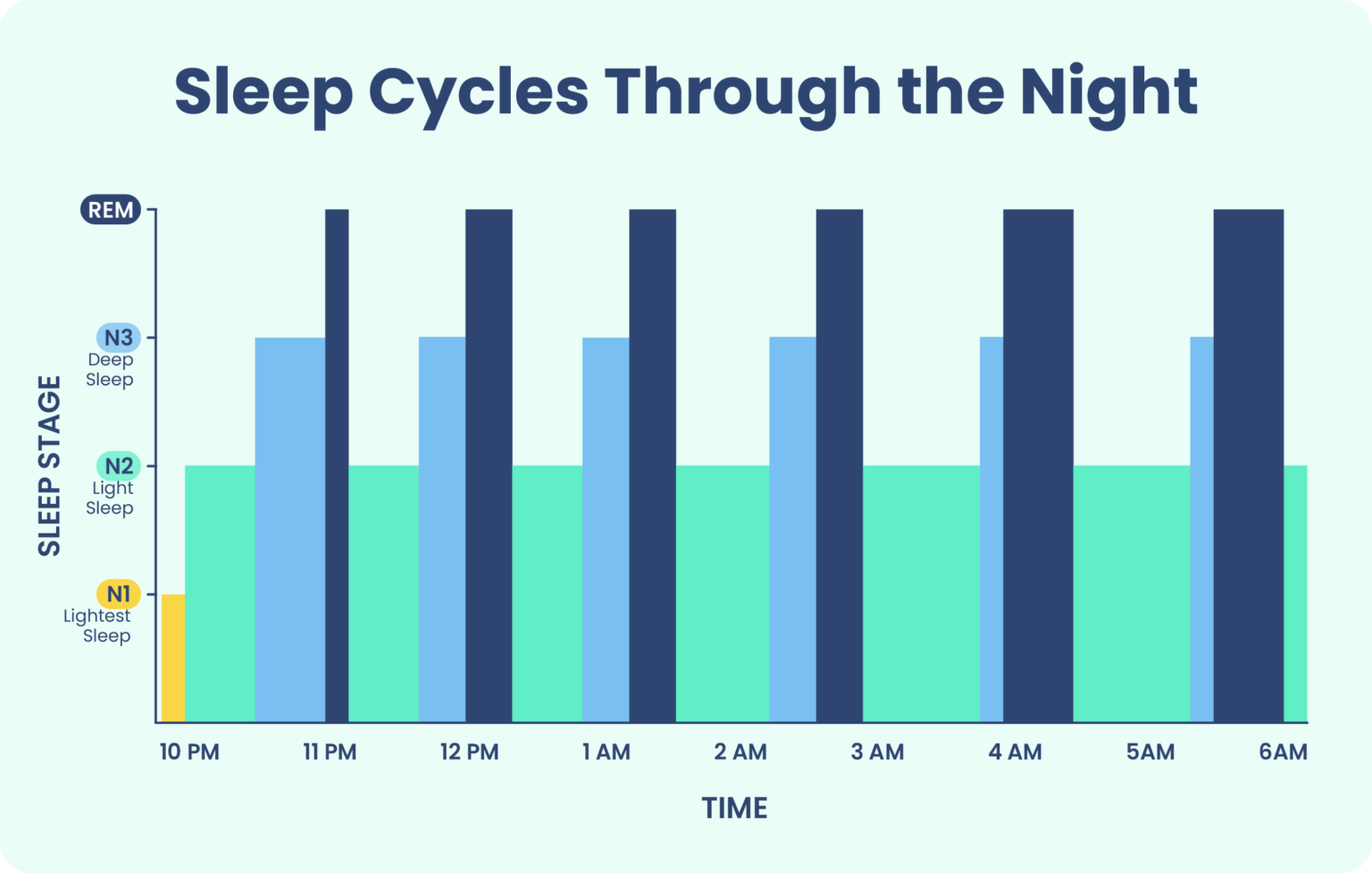Understanding Sleep
Created: Jul 20, 2024
Updated: Jul 20, 2024
Understanding how we sleep is important to learning how to improve it 💤
Brain
- brainstem
- cerebrum
- largest part of brain, uppermost of the brain
- contains a lotta stuff, including the cortex (surface tissue of cerebrum)
- major part responsible for cognition
- cerebellum
- little brain, lower part of brain
- most associated with movement functions (most studied)
- can also be responsible for other stuff like language, motor control, emotions, etc
Brainwaves reference
Note that brainwaves are measured using EGG, which may or may not lead to fully conclusive results. These are just approximate conclusions.
- Delta waves
- 0-4 Hz
- deep sleep
- has been measured to be prevealent in thalamus or cortex
- Theta
- 4-8 Hz
- deep meditation, very relaxed
- Alpha waves
- 8-12 Hz
- relaxed calm state, between the "conscious" and "subconscious" state
- most researched area is in occipital lobe (as of date)
- most prevalent when closing eyes and awake/drowsy, goes away in sleep
- can also occur when thinking in "autopilot"
- Beta
- 12-40 Hz
- awake, everyday thinking, speaking, reasoning, etc
- prefrontal cortex? frontal lobe? usually associated with actions/reasoning
- Gamma
- 40-100 Hz
- locked in, learning something new, hardcore focused
Generally, if you have high frequency brainwaves a majority of the time (meaning even when you're supposed to rest you still have fast brainwaves like beta/gamma), this could mean you're stressed/anxious.
On the other hand, if you have low frequency brainwaves a majority of the time (meaning in times when you're supposed to be learning your brainwaves are slow), this could mean some brain injury, depression, learning issue, or other reason that you're not paying attention well (may simply be daydreaming way too often, too).
Sleep stages
Two distinct stages:
- NREM (non-rapid eye movement)
- REM (rapid eye movement)
When falling asleep, NREM is entered first, then REM. Homeostasis functions occur often during NREM, while in REM it becomes more rough.
- Closing eyes
- trying to fall asleep, relax body, etc
- becoming drowsy (hopefully)
- transitioning into alpha waves
- NREM stage 1
- light sleep, or very drowsy
- transitioning from alpha to theta waves
- NREM stage 2
- deeper sleep stage, lots of transitioning and changes happening
- spend the most amount of time in this stage
- sleep spindles occur frequently
- short bursts of brain activity (mainly beta waves) (11-16 Hz)
- unclear on their purpose, if they support synaptic plasticity and long term memory consolidation and learning
- apparently can play a role in sensory gating, blocking out disturbances during sleep (like unwanted sounds, e.g. you don't awaken from small lil' noises, probably)
- k-complex waves start to appear
- long delta waves (last half second to one) that has very high and very negative peaks of voltages
- oftentimes followed by a sleep spindle
- function is unclear, may help in activating homeostasis and memory consolidation
- also may help in keeping/maintaining sleep state (hence probably why it's a calmer brainwave, followed by sleep spindle)
- sometimes have alpha wave intrusions (can also occur in stage 3), where alpha waves appear all of a sudden
- may be linked to just being alert all the time
- NREM stage 3
- deep sleep, slow wave sleep (0.5-4.5 Hz), but high amplitude
- delta waves most prevalent
- the most important stage, allows body to actually recover
- some dreaming but not as much as during REM, it's much more random and less memorable
- you feel the most groggy when awakening from this stage (probably because you're going from very slow waves to fast waves in a short amount of time)
- very distinct correlation with age
- as they get older, they spend less time in this stage, perhaps because as aging occurs, homeostasis functions tend to decline (which occur frequently in this stage)
- one of the longest stages of NREM initially (for first few hrs), but as night continues, this stage decreases in time and is replaced with more REM
- REM
- weird "paradoxical" stage, brain frequency increases similar to being awake, but muscle contractions are decreased (muscle tone decreases)
- a mixture of light and deep sleep, depending on criteria - it's a "unique" state
- in terms of muscle tone, can be considered deep
- in terms of brain activity, can be considered light
- homeostasis functions decline a bit, heart rate may increase, breathing irregular
- lots of vivid dreaming
- most people usually wake up naturally during or after REM
- probably plays a role in memory consolidation
One sleep cycle is usually N1-N2-N3-N2-REM. Whole sleep cycle is typically 90 20 minutes.
 Image source from Sleep Foundation Organization
Image source from Sleep Foundation Organization Effects of noise/sound on sleep
Lots of noise can disrupt sleep and cause poor sleep quality.
Some people claim that music can help in sleeping:
- stimulate sleep or induces a relaxing state for sleep
- habit
- distracts/act as a background noise
Whether or not it actually works is inconclusive.
Some people also use white/pink/brown noise to help them fall asleep better.
TODO research this up better, and evaluate which stages it helps
Hypnosis and effects
TODO research hypnosis
Sources
A ton of Wikipedia, random sites, and some papers:
- https://en.wikipedia.org/wiki/Sleep
- https://en.wikipedia.org/wiki/Non-rapid_eye_movement_sleep
- https://en.wikipedia.org/wiki/Rapid_eye_movement_sleep
- https://en.wikipedia.org/wiki/Human_brain
- https://en.wikipedia.org/wiki/Neural_oscillation
- https://en.wikipedia.org/wiki/Electroencephalography
- https://lucid.me/blog/5-brainwaves-delta-theta-alpha-beta-gamma/
- https://brainworksneurotherapy.com/what-are-brainwaves
- https://www.scientificamerican.com/article/what-is-the-function-of-t-1997-12-22/
- https://en.wikipedia.org/wiki/Sleep_spindle
- https://en.wikipedia.org/wiki/K-complex
- https://www.britannica.com/science/sleep/Light-and-deep-sleep
- https://www.sleepfoundation.org/stages-of-sleep
- https://www.sleepfoundation.org/how-sleep-works/alpha-waves-and-sleep
Some interesting papers:
- https://www.ncbi.nlm.nih.gov/books/NBK526132/
- https://www.ncbi.nlm.nih.gov/books/NBK557469/
- https://www.ncbi.nlm.nih.gov/pmc/articles/PMC6235300/
- https://www.cell.com/current-biology/fulltext/S0960-9822(10)00778-5
- https://www.ncbi.nlm.nih.gov/pmc/articles/PMC8318210/
